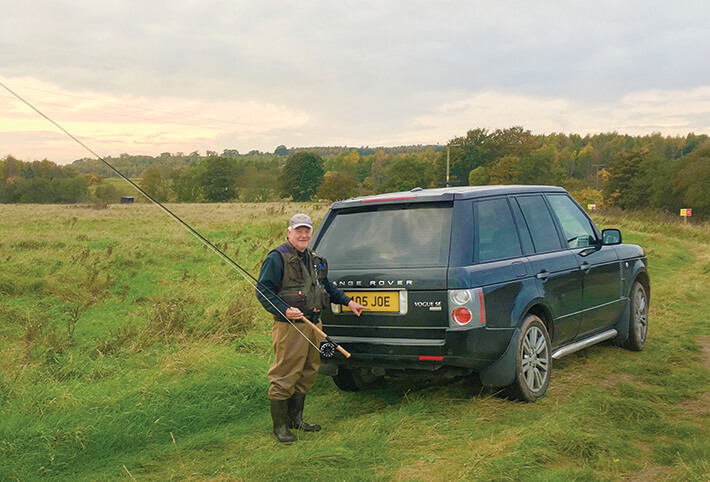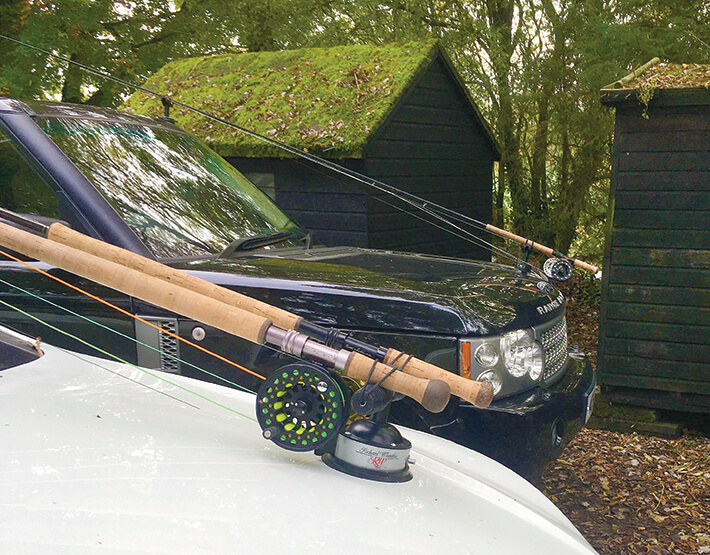
By J.P. Burleigh:
During the fall of 2016, I had the immense privilege of living in Edinburgh, the capital of Scotland. Apart from whiskey, kilts and bagpipes, Scottish culture also lays claim to the origins of fly fishing. Although historians disagree about where and when fly fishing began, there is strong evidence to suggest that Scotland gave birth to the sport centuries ago. Fly fishing is heavily rooted in Scottish history, and the waters of Scotland still teem with beautiful fish.
My first stop exploring Edinburgh was neither the castle nor any museum, but the Edinburgh Trout Anglers Club, the meeting grounds of a group of likeminded individuals bound by a common love of fish and drink. I was welcomed by Alex Bell, the president, and introduced myself to the members who were intrigued to meet an eager young American angler. Over a few pints and games of snooker, I listened to fish stories and soaked in the wisdom of how and where to fish in Scotland.

All inland water of the United Kingdom is privately owned, which means fishing requires written permission—usually at a fee—from the landowner. This cultivates an exclusive spirit for the sport; the best runs are often expensive to fish for the day. At the same time, competition for business encourages landowners to take good care of their fisheries. Many times a full-time “ghillie” is hired to take care of the water.
My first catch in Scotland came the next weekend on a hike on Mt. Roshven, which overlooks Lochailort, a sea loch on the northwest coast of Scotland. After a four-hour adventure to the summit, my two friends and I found our way down the mountain by following a trickle of water until it grew into a stream. It led us down the side of the mount into a valley, over rolling hills until we at last reached the bottom. Before the stream met the loch, I assembled my trusty 5-weight, tied on a Prince Nymph and cast. To my delight, a wild brown trout eagerly nailed the fly as I crawled it back to me.
Relaying this story gave me a bit of credibility back at the Trout Anglers Club. I received an invitation to join them on their last outing of the year to Loch Leven, home to Lochleven Castle, where Mary Queen of Scots was held prisoner. I went out with club members and fished from a “clinker” – an old wooden rowboat that had been fitted with an outboard. Once a world-renowned brown trout fishery, the loch has fallen victim to farm runoff. Although a majestic place to practice casting, we caught no fish that day.
Hungry for more, I recruited my friend Joe Bell from the club, whom I fished with on Loch Leven, to go on a salmon expedition on the River Earn one Saturday. Although not the most expensive river to fish in the area, we were taken good care of by the ghillie Sandy MacIntosh, a short man with rosy cheeks who dressed in green overalls. He treated us to coffee with whiskey in the lodge before walking us along the river, showing us the best spots from which to cast. Even though none of the four people Sandy hosted that day landed a fish, getting the full experience of fishing a Scottish river is something I will never forget.
My greatest achievement fishing in Scotland came on an individual trip. Early one morning, I boarded a train to the town of Galashiels, in the Borders area near England. I hopped off the train, took a bus for a bit, then hitchhiked the rest of the way to the famed River Tweed—one of the premier salmon rivers in Scotland. Salmon season was over, though, and I was there for grayling—a less targeted species and subsequently far cheaper to get a permit for. I searched the water by Czech nymphing, which is high-sticking heavy flies along the very bottom. With less than an hour of daylight left, I finally felt a tug and set the hook in a mouth of a beautiful grayling. There is nothing like the feeling of success on a self-guided fishing trip.

Those are the highlights of my time fly fishing Scotland, where the sport itself emerged. I made many friends, some with legs and some with fins, and saw some of the most beautiful rivers and country in the world. If you ever have the chance to visit the northernmost nation of the United Kingdom, leap at the opportunity. The people, the land, and the fish there are unlike anywhere else, and you’ll be sad to leave them.